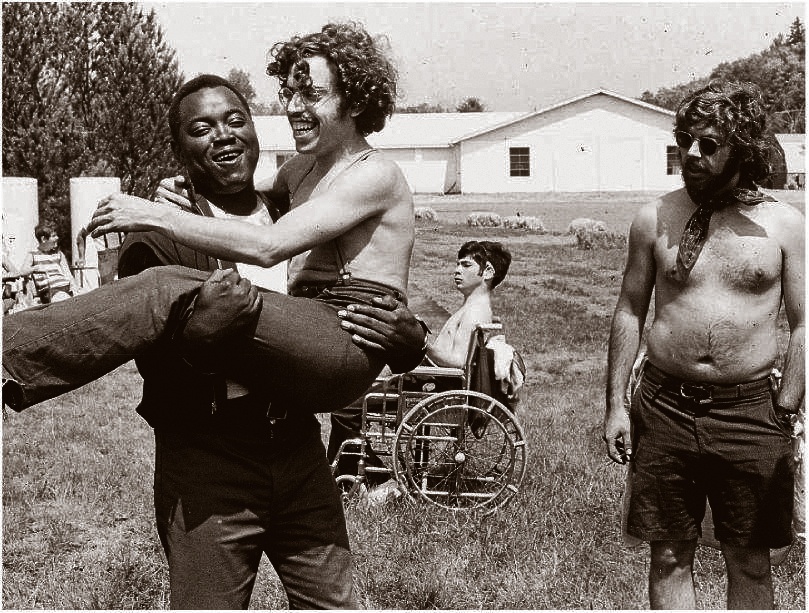Movie Review: Crip Camp Shows Change Can Come From Anywhere
Crip Camp may sound like a politically incorrect title for a film about kids with disabilities. It is, in fact, a compelling documentary that follows a group of teenagers with disabilities having the summer of their lives. It takes place in the early 1970s in upstate New York and continues with their involvement in the struggle for the rights of the disabled.
From the 1950s to the 1970s, Camp Jened (the camp’s actual name) was a unique place for teens of varying disabilities to feel included and welcome.
Movie Review: Crip Camp Shows Change Can Come From Anywhere
Crip Camp may sound like a politically incorrect title for a film about kids with disabilities. It is, in fact, a compelling documentary that follows a group of teenagers with disabilities having the summer of their lives. It takes place in the early 1970s in upstate New York and continues with their involvement in the struggle for the rights of the disabled.
From the 1950s to the 1970s, Camp Jened (the camp’s actual name) was a unique place for teens of varying disabilities to feel included and welcome.
The second offering from Barack and Michelle Obama’s production company Higher Ground, Crip Camp: a Disability Revolution won the audience award at the Sundance Film Festival this year. Since becoming available on Netflix, it has gained a wider audience as well as rave reviews.
From the 1950s to the 1970s, Camp Jened (the camp’s actual name) was a unique place for teens of varying disabilities to feel included and welcome. It transformed them with an insight into how life could be, so different from what they experienced in the outside world. This included playful references to a hierarchy within the disability community, athletic activities, and summer romances.
The second half of the film changes from light-hearted to more serious as it chronicles how some of these campers challenged government officials to make the world more accessible, with ramps and bathroom stalls; but, more importantly, for acceptance.
Their efforts led to the Rehabilitation Act of 1973, which extended vocational rehabilitation services to those with disabilities; Section 504 shielded those with disabilities from discrimination, and the Americans With Disabilities Act of 1990.
Compelling, funny, insightful and eye-opening, the movie’s overriding message is clear: People with disabilities are people first.
Which is why the Brain Injury Alliance of Arizona (BIAAZ) presented Crip Camp, the first of our Empowering Cinema Series, to residents of Everlasting Community Services who are recovering from Traumatic Brain Injury (TBI).
Their reviews of the film were thought-provoking as the themes hit home. Many were surprised that the movement had been going on for fifty years:
“I liked how they were bringing awareness to the abled community.”
“It’s sad because in that time people’s disabilities were involved in the community. Today, people are afraid to ask what’s wrong with you.”
“There are a lot of people out there now who will help disabled people.”
Despite the decades-long battle for equality, several viewers felt as though there hasn’t been nearly enough progress.
“That movie inspired me. Fifty years later, the world is going back to shunning me. All their good work has been for nothing.”
“People look at you like you’re not worth their time, even to those of us who don’t look disabled.”
“Speech impediment (is also seen as a) learning disability, all because of peer pressure. You don’t want to be viewed as weak.”
By identifying with the campers/trailblazers, viewers felt their pain on a very personal level.
“I hate it when people say I know what I’m going through or feel. No, you don’t! Even others with disabilities, each is different, it’s not the same experience.”
“People need to not be afraid to ask about our disability. I didn’t know (another resident) had brain injury. First day, I thought he was staff.”
“People just aren’t understanding. They don’t ask the tough questions of the disabled.”
Perhaps the strongest response succinctly summarized the core message of Crip Camp:
“They were straight up being ignored by everybody until they started standing up for themselves.”
Looks like the spirit of activism, especially within the disability rights community, lives on.
For an unforgettable experience, watch the full feature Crip Camp: A Disability Revolution, courtesy of Netflix.
ABOUT BRAIN INJURY ALLIANCE OF ARIZONA
The Brain Injury Alliance of Arizona (BIAAZ) is the only statewide nonprofit organization dedicated to improving the lives of adults and children with all types of brain injuries through prevention, advocacy, awareness and education. BIAAZ also houses the Arizona Brain Health Resource Center, a collection of educational information and neuro-specific resources for brain injury survivors, caregivers, family members and professionals.
What began in 1983 as a grassroots effort has grown into a strong statewide presence, providing valuable life-long resources and community support for individuals with all types of brain trauma at no charge.
The Brain Injury Alliance of Arizona:
- Works with Congressional Brain Injury Task Force
- Houses Arizona Brain Health Resource Center
- Hosts Statewide Opioid Use Disorder & Cognitive Impairment Workgroup
- Has Statewide Opioid Use Disorder & Cognitive Impairment Response team with peer support, training, and family wraparound services
- Facilitates Brain Health Advisory Council
- Manages statewide Neuro Info-Line: 888-500-9165






